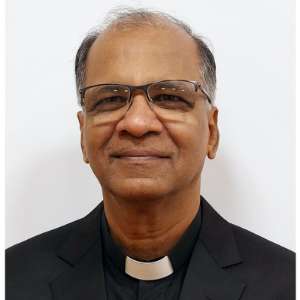“Business is a noble vocation, directed to producing wealth and improving our world. It can be a fruitful source of prosperity for the areas in which it operates, especially if it sees the creation of jobs as an essential part of its service to the common good.”

Overview
Despite significant progress in recent decades, extreme poverty persists and environmental degradation continues. Far too many lack access to the goods and services that are essential to survive and thrive. Tragically, it is typically those on the margins that find themselves most excluded from the benefits of the market system. At the same time, inequality in income and wealth remains high both within and between countries.
The movements for sustainable development, just resource allocation, and humanistic management practice and policies give us hope that business may be the surest and best hope for addressing the urgent problems of our day. The corporate social responsibility movement has affected businesses of all sizes. Other movements such as the triple bottom line, the Global Reporting Initiative, and the United Nations Global Compact with Business are calling attention to the fact that we cannot continue to do “business as usual.”
Universities and, in particular, undergraduate and graduate business schools play a crucial role in addressing these challenges and building opportunities for positive change. Their responsibility, at a minimum, is to help raise student awareness, to help provide a framework for reflection on the role each student plays in being part of the solution, and to support students and faculty as they develop concrete ways in which they can become part of the solution to these challenging issues.
Project
Beginning in March 2019, 12 business education leaders met at the invitation of the International Association of Jesuit Universities (IAJU) to consider how Jesuit business education might address the growing challenges to the reigning economic order. The task force members were especially inspired by Pope Francis’s encyclical, “Laudato Si,” and by the United Nation’s Sustainable Development Goals. They listened to the voices of concerned students, to faculty who have taken a lead in reinventing business education and to a host of thought leaders interested in forging a new economic paradigm.
That IAJU Working Group prepared a white paper entitled, “An Inspirational Paradigm for Jesuit Business Education.” which was released in June 2020. It presents the case for a re-examination of how we prepare the next generation of business leaders. It asks us as academic leaders in Jesuit business education globally to inaugurate a conversation within our schools and among the faculty in our Jesuit network and beyond: how can we respond to the global challenges which we and our students will face, challenges that are more evident each day? How can we better prepare our students to lead in the creation of a more inclusive and just world?
The new educational paradigm has a number of elements to make it relevant, effective, and meaningful—and truly Jesuit:
- Re-creating the economics, business, and finance curricula
- Use of the Ignatian pedagogical paradigm.
- A vision of the essential skills needed for this new kind of leadership.
- The role of key stakeholders.
Since the release of the Inspirational Paradigm in June 2020, Jesuit business educators from around the world have worked to change the way we educate future business leaders. For example, the subsequent World Forums of the International Association of Jesuit Business Schools (IAJBS) and annual meetings of Colleagues in Jesuit Business Education (CJBE) have focused on how to pursue the Inspirational Paradigm.
Similarly, the Association of Jesuit Colleges and Universities (AJCU) Business School Deans Network encouraged the development of materials to assist Jesuit business schools worldwide to align themselves with the Inspirational Paradigm with two rounds of a challenge grant program.
Starting in March, 2023 and again in March, 2024, third and fourth rounds of funding were launched, with these being collaborations between AJCU, IAJBS, and CJBE, and it is anticipated that there will be several more rounds of funding in the next two or three years.
The resulting faculty work from the grants has been posted to the Ignited website for dissemination to Jesuit business educators globally.
The original taskforce was re-organized in September 2022 and has focused on how to support the pursuit of the Inspirational Paradigm across our global Jesuit business school network. It continued to look for opportunities to collaborate with others who shared our commitment to a re-examination of business education. In August 2024, the membership was again updated, and in the coming year will be focusing on increased awareness of the Inspirational Paradigm across our Jesuit network, including more regional collaboration around the paradigm.
For questions about the ongoing work of the taskforce, please contact the co-chairs, Cristina Gimenez Thomsen ([email protected]) and Joseph Phillips ([email protected]).
LINKS OF INTEREST
A Workbook on Effective Collaboration
A workbook to enable Ecoteams in each Jesuit Conference to grow and strengthen the process of greater collaboration.
A report presented by the ‘Ecology Task Force discusses the deterioration of the environment, the reconciliation with creation, the effect on living conditions, and the ways to preserve the environment.
The pope critiques consumerism and irresponsible development, laments environmental degradation and global warming, and calls the world to take "swift and unified global action."
IAJBS: International Association of Jesuit Business Schools
CJBE: Colleagues in Jesuit Business Education
ECOJESUIT: Ecology and Jesuits in Communication, Ignatian advocacy group
IAJES: International Association of Jesuit Engineering Schools
HEST: Higher Education for Social Transformation, Cluster in Ecology and Environmental Challenges.
Red de Homólogos de Ambiente y Sustentabilidad
REPAM: Red Eclesial Pan-Amazónica
subcommittees
Alvaro de la Rica, Chair, Dean at Deusto, UNIJES, Spain
Marianus Kujur, SJ, XISS, Ranchi, India
Claudia Ibarra, Dean at ITESO, Mexico
Ricardo Flores, Dean at UCA El Salvador, Central America
Gisela Veritier, Dean at ICDA for East Latin America
Eduardo Saavedra, Dean at Universidad Alberto Hurtado de Chile for West Latin America
Joe Eisenhauer, Dean at Detroit Mercy, USA
Karl Alorbi, Faculty at St. Peter’s, USA
Pilar Tolentino, Faculty at Ateneo Manila, Philippines
Gisela Veritier, Chair, ICDA Business School of the Catholic University of Córdoba
Joan Lee, Professor, Fairfield
Michael Pierson, Professor, Fordham
Itzel Palomares, Research Professor, ITESO
Prashant Malaviya, Professor, Georgetown
Marta de Vicente Lama, Senior Lecturer, Loyola Andalucia
Abel B. N’Djomon, SJ, Program Head, CERAP
Assunta Cuyegkeng, Professor, Ateneo Manila
S. George, SJ Director, XLRI
Javier Marquez Vigil Professor, Universidad Pontificia Comillas
Dayle Smith, Chair, Dean, Loyola Marymount
Jim Joseph Dean, Le Moyne College
Barnali Gupta Dean, St. Louis
Claudia Ibarra Dean, ITESO
Teresa Corzo Santamaria Dean, Comillas
Colette Darcy Dean, National College of Ireland Colette.
Roberto Galang Dean, Ateneo Manila
Isabelle Chaquiriand Dean, Uruguay
Joseph Arun, SJ Director, LIBA
Nicky Santos, SJ Chair, Associate Professor, Creighton
Rudy Ang, VP for Administration and Info Systems, Ateneo Manila
Jose Dela Cerda Professor, ITESO
Jimmy Hill VP Academic Affairs, National College of Ireland
Dominic H. Chai, SJ Graduate Student, Boston College
Tracy Couto Director, Savage-McGill Center, Le Moyne College
Pilar Castro Gonzales Dean, Loyola Andalucia
Georges Aoun Professor, St. Joseph Beirut














